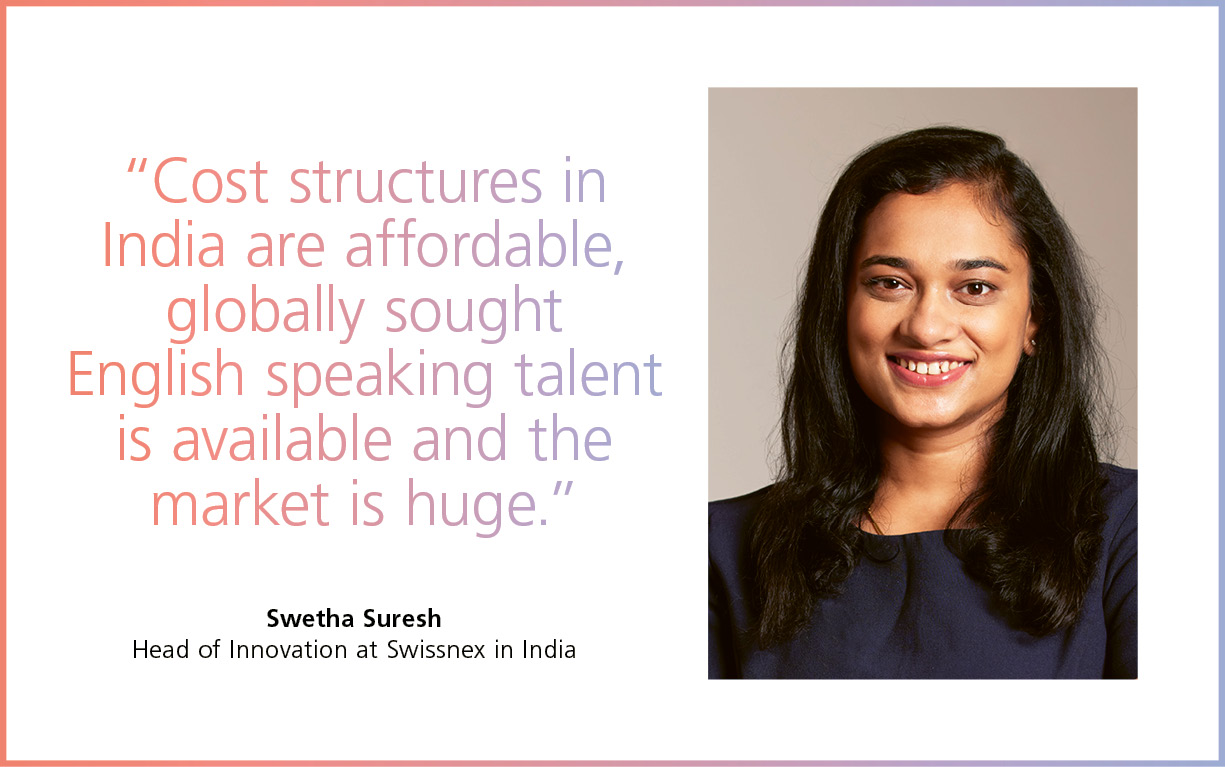
Market entry: Swiss businesses find internationalisation challenging when it comes to India given that it is a country of many different nuances. The Innosuisse camp helps them understand the business culture, analyse the market, strategize go-to-market approaches and build business models based on potential customer feedback.
A two-step entry process via market validation and entry camps is offered. This helps businesses understand what it would take to enter India as a market via the validation camp and make a go or no-go decision. An entry camp accelerates growth by putting a start-up in front of first potential customers and partners and assists it in acquiring or hiring the right skills on the ground.
Network: Tailored individual support is provided. This includes connections for knowledge exchange and potential first customers or partners that are relevant for the start-up business.
Product validation: The incredible diversity, market size and business approaches in India are both a challenge and an opportunity. Whether it is a test market for novel technologies, a tech co-developer or a market itself, India has something to offer to start-ups looking to explore a new market. However, no business entity can airdrop solutions and hope for similar results across all markets - understanding local conditions is a must. Swissnex in India is a trusted partner with a deep understanding of the country’s market. Since 2013, over 60 Swiss start-ups have been mentored through different programmes that explore market discovery, market validation and market entry in India.
Follow-up: Long term vision and relationships are essential for businesses to succeed. Swissnex in India helps cement relationships after the camp ends.
Why expand into India?
India is an attractive country for Swiss start-ups for several reasons. Cost structures are affordable, globally sought English speaking talent is available and the market is huge. With 1.4 billion people, India is about to become the most populated country in the world. This large population has led to Indian companies to focus on consumer-led problems while the Swiss focus on deep tech problems. This complementary system works.
Numerous international corporates have chosen to make their India offices centres of excellence. The meticulous planning, monitoring and innovative business strategies needed to succeed in India have provided templates to replicate success in other countries too!
What is the Indian market like?
Swiss start-ups can expect an inclusive, informal and dynamic entrepreneurial ecosystem. Business partnerships run on trust, cost effectiveness and reliability. The ingredients to achieve this are patient capital, an on-the-ground presence, long-term vision and relationships that take time to build.
What is the state of innovation?
In a few years, India has gone from being a centre for outsourcing services to a country that is flourishing as it grows its research and development (R&D) sector. There are more than 125 R&D centres in fields such as engineering, computer science, basic and applied sciences, and aerospace. India and Bangalore are excellent locations to collaborate with companies active in fields as varied as ICT, medical technology, clean technology, design, biotech, healthcare and gastronomy, just to name a few.
How easy is it to find qualified employees and partners?
India offers a vast talent pool of skilled employees with significant cost advantages. The higher education system boasts over 700 universities and 35,000 colleges. 13 management institutes and 17 technology institutes there are among the top 100 management and engineering institutes in the world.
The start-up ecosystem is very inclusive. Start-ups are surrounded by investors and mentors and encouraged by incubators, accelerators and venture capitalists, all willing to share their knowledge and provide support. They can also take part in support groups and co-working spaces. This favourable environment allows international companies to target foreign markets.
What are the advantages of India?
India is a very large market with an urban middle class that has growing purchasing power. The country is full of English-speaking talent. The metropolitan cities of Bangalore, Delhi and Mumbai are globally connected and ranked in the top 50 start-up ecosystems globally. India continues to rank first in ICT services exports and holds top rankings in other indicators. These include venture capital recipients’ value (at 6th), finance for start-ups and scale-ups (at 8th), graduates in science and engineering (at 11th), labour productivity growth (at 12th) and domestic industry diversification (at 14th), according to the Global Innovation Index 2022.
What are the challenges?
The Indian market has many layers, levels and segments. It is therefore crucial to spend time building relationships and take an open approach to India and its people. If an international organisation successfully enters this market, it can use this knowledge and experience to build and manage companies around the world.
Last modification 09.01.2023
Contact
Information and registration for the camp in India
Swetha Suresh
Swissnex in India
LinkedIn
Twitter
E-mail
Information and Counselling Services at Innosuisse
Marcel Hofstetter
+41 58 480 86 40
E-mail





